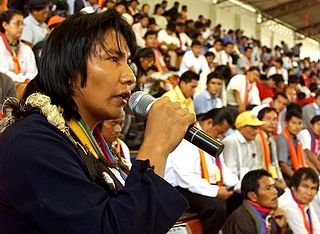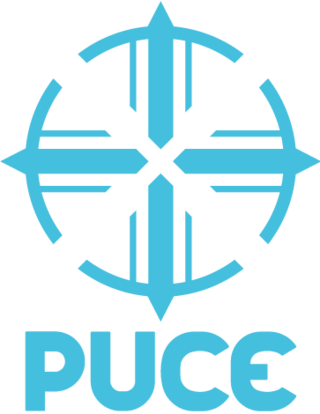
Ecuador, officially the Republic of Ecuador, is a country in northwestern South America, bordered by Colombia on the north, Peru on the east and south, and the Pacific Ocean on the west. Ecuador also includes the Galápagos Islands in the Pacific, about 1,000 kilometers (621 mi) west of the mainland. The country's capital is Quito, but its largest city is Guayaquil.
The History of Ecuador covers human habitation in the region reaching back 8,000 years.

The politics of Ecuador are multi-party. The central government polity is a quadrennially elected presidential, unicameral representative democracy. The President of Ecuador is head of state and head of the army on a multi-party system, and leads a cabinet with further executive power. Legislative power is not limited to the National Assembly, as it may to a lesser degree be exercised by the executive which consists of the President convening an appointed executive cabinet. Subsequent acts of the National Assembly are supreme over Executive Orders where sufficient votes have been cast by the legislators. The judiciary is independent of the executive and the legislature. Ecuador is also considered a constitutional republic.

The economy of Ecuador is the eighth largest in Latin America and the 69th largest in the world by total GDP. Ecuador's economy is based on the export of oil, bananas, shrimp, gold, other primary agricultural products and money transfers from Ecuadorian emigrants employed abroad. In 2017, remittances constituted 2.7% of Ecuador's GDP. The total trade amounted to 42% of the Ecuador's GDP in 2017.

Lucio Edwin Gutiérrez Borbúa served as 43rd President of Ecuador from 15 January 2003 to 20 April 2005.
The Fundación Colegio Americano de Quito or Colegio Americano de Quito is a private college preparatory school in Quito, Ecuador. In 1940 it was founded by the former president of Ecuador and the president of the Organization of American States (OAS) Galo Plaza Lasso, and Boaz Long.

The Confederation of Indigenous Nationalities of Ecuador or, more commonly, CONAIE, is Ecuador's largest indigenous rights organization. The Ecuadorian Indian movement under the leadership of CONAIE is often cited as the best-organized and most influential Indigenous movement in Latin America.

Jorge Jamil Mahuad Witt is an Ecuadorian lawyer, academic and former politician. He was the forty-first president of Ecuador from 10 August 1998 to 21 January 2000.

Diego Borja Cornejo is an Ecuadorian economist and politician born in Quito, Ecuador. Between 2005 and 2006 he served as Minister of Economy and Finance. He was elected member of the National Constitutional Assembly on September 30, 2007. He resigned this position to be appointed Coordination Minister for Economic Policy on December 23, 2008

Rafael Vicente Correa Delgado is an Ecuadorian politician and economist who served as President of Ecuador from 2007 to 2017. The leader of the PAIS Alliance political movement from its foundation until 2017, Correa is a democratic socialist and his administration focused on the implementation of left-wing policies. Internationally, he served as president pro tempore of the UNASUR.
The Ecuadorian Constitution requires that all children attend school until they achieve a “basic level of education,” which is estimated at nine school years.
The 1998–99 Ecuador economic crisis was a period of economic instability that resulted from a combined inflationary-currency crisis, financial crisis, fiscal crisis, and sovereign debt crisis. Severe inflation and devaluation of the sucre led to President Jamil Mahuad announcing on January 9, 2000 that the U.S. dollar would be adopted as the national currency. Poor economic conditions and subsequent protests against the government resulted in the 2000 Ecuadoran coup d’état in which Jamil Mahuad was forced to resign and was replaced by his Vice President, Gustavo Noboa.
Ecuador is a country in South America.
The 2000 Ecuadorian coup d'état took place on 21 January 2000 and resulted in President Jamil Mahuad being deposed, and replaced by Vice President Gustavo Noboa. The coup coalition brought together a short-lived junta composed by the country's most powerful indigenous group, Confederation of Indigenous Nationalities of Ecuador (CONAIE), and a group of junior military officers led by Lieutenant Colonel Lucio Gutiérrez.

The Pontificia Universidad Católica del Ecuador (PUCE) is a Pontifical Catholic university founded in 1946 in Quito, Ecuador.

The nations of Ecuador and Mexico established diplomatic relations in 1830. Both nations are members of the Community of Latin American and Caribbean States, Latin American Integration Association, Organization of American States, Organization of Ibero-American States and the United Nations.

Wilma Josefina Salgado Tamayo is an Ecuadorian politician and economist.

The 2019 Ecuadorian protests were a series of protests and riots against austerity measures including the cancellation of fuel subsidies, adopted by President of Ecuador Lenín Moreno and his administration. Organized protests ceased after indigenous groups and the Ecuadorian government reached a deal to reverse the austerity measures, beginning a collaboration on how to combat overspending and public debt.

The Ministry of Economy and Finance is a cabinet ministry of the government of Ecuador responsible for overseeing the nation's public finances.

Mauricio Montalvo Samaniego is serving as the Ecuadorian Minister of Foreign Affairs since 24 May 2021. He has an LLM from Harvard. He has served as ambassador to the UN in Geneva, in the Ecuadorian Mission to OAS, among others.














